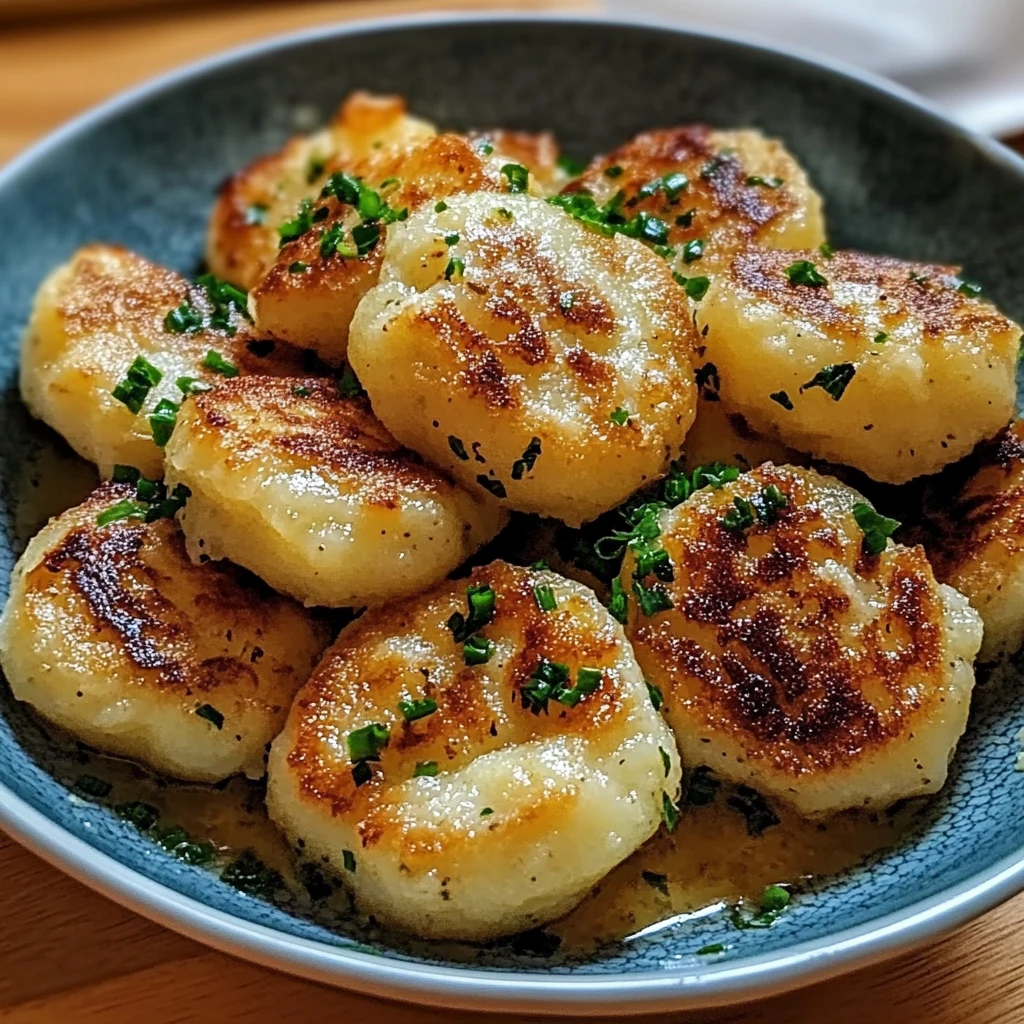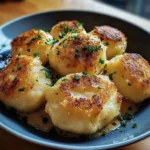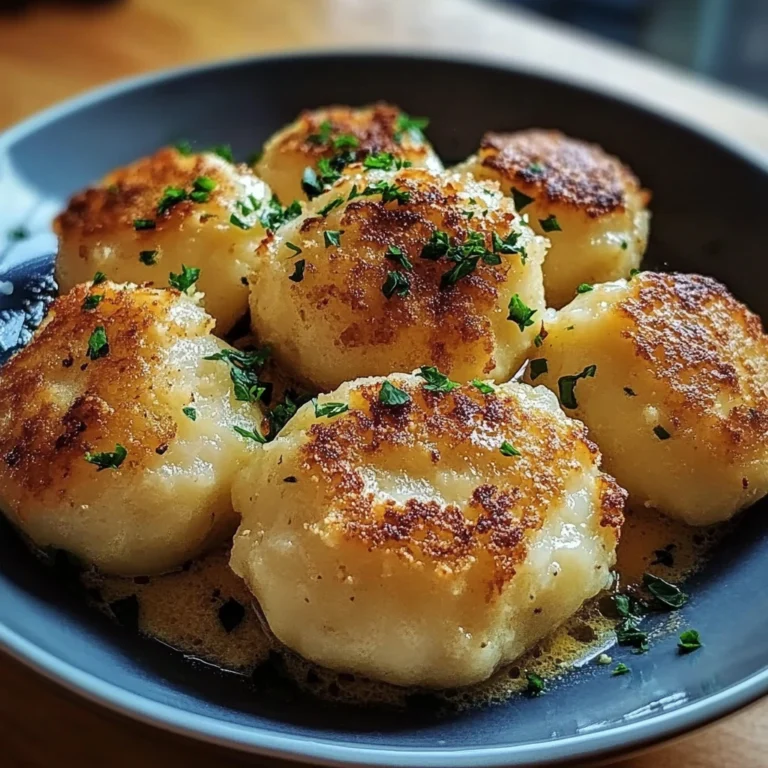German cuisine is renowned for its hearty, comforting dishes, and at the heart of this culinary tradition lies the humble yet delectable German Potato Dumplings. These pillowy soft spheres of mashed potato and flour are a quintessential side dish that has been satisfying palates for generations. Whether you’re a seasoned connoisseur or a newcomer to German cuisine, exploring the captivating world of German Potato Dumplings is a culinary adventure worth embarking on.
Table of Contents
The Ingredients That Make German Potato Dumplings Shine
At the core of German Potato Dumplings are just a few simple, yet essential ingredients: starchy potatoes, all-purpose flour, and a single egg. The key to achieving the perfect texture lies in the selection and preparation of these core components. Russet potatoes, with their high starch content, are the recommended choice for creating the smooth, velvety mashed base. The all-purpose flour helps to bind the dough, while the egg adds richness and cohesion. Optional seasonings, like nutmeg or onion powder, can be added to enhance the flavor profile.
The quality of the ingredients plays a crucial role in the success of German Potato Dumplings. Selecting freshly harvested, high-quality potatoes and using a reliable all-purpose flour will ensure a consistently delicious result. While substitutions can be made, such as using Yukon Gold potatoes or gluten-free flour, the traditional recipe relies on these classic ingredients to achieve the perfect texture and taste.
Step-by-Step Guide to Making Authentic German Potato Dumplings
Crafting German Potato Dumplings is a straightforward process that rewards patience and attention to detail. Begin by boiling the peeled potatoes in salted water until they are tender and easily mashed. Drain the potatoes and allow them to cool slightly before mashing them until they are smooth and free of any lumps. It’s crucial to let the mashed potatoes cool completely before proceeding, as warm potatoes can result in a sticky, unworkable dough.
Once the mashed potatoes have cooled, combine them in a large bowl with the all-purpose flour, egg, and any desired seasonings, such as a pinch of nutmeg or onion powder. Gently mix the ingredients until a soft, slightly sticky dough forms. Be careful not to overwork the dough, as this can result in tough, dense dumplings.
With lightly floured hands, form the dough into small, golf ball-sized balls. Bring a large pot of salted water to a gentle simmer and carefully add the dumplings. Cook them for 10 to 15 minutes, or until they float to the surface, indicating they are cooked through.
Remove the cooked German Potato Dumplings from the water using a slotted spoon and serve them warm, either on their own or accompanied by your choice of savory sauces, gravies, or sautéed onions.

Serving Suggestions for German Potato Dumplings
German Potato Dumplings are traditionally served as a side dish, perfectly complementing a variety of hearty main courses. They pair exceptionally well with rich, flavorful gravies, such as a classic mushroom gravy or a robust beef stew. The dumplings also shine when accompanied by sautéed onions, which add a touch of sweetness and complexity to the dish.
Beyond these traditional pairings, German Potato Dumplings can be enjoyed in a multitude of ways. They make a delightful accompaniment to roasted meats, like pork schnitzel or sauerbraten, and can even be incorporated into casseroles or baked dishes for a satisfying, comforting meal.
Exploring the Variations of German Potato Dumplings
While the classic German Potato Dumplings recipe remains a beloved staple, there are numerous regional variations that offer unique twists on the traditional dish. In the Thuringian region, for example, the dumplings are often made with a combination of potatoes and bread, while the Bavarian version may include the addition of breadcrumbs or semolina for a slightly denser texture.
Adventurous home cooks can also experiment with incorporating different flavors into their German Potato Dumplings, such as herbs, spices, or even cheese. These creative variations allow you to put your own personal stamp on this timeless German specialty.
Frequently Asked Questions
What are German potato dumplings called?
In German, German Potato Dumplings are known as “Kartoffelknödel” or “Kartoffelnudeln.” These terms are used interchangeably to refer to this beloved side dish.
What’s the difference between a pierogi and a potato dumpling?
While both German Potato Dumplings and pierogies are dumplings made with potato, the key difference lies in their origins and preparation. Pierogies are a traditional Polish dish, often filled with a variety of savory or sweet fillings, while German Potato Dumplings are a more simplistic, unfilled dumpling that is boiled and served as a side dish.
What is the difference between gnocchi and potato dumplings?
Gnocchi and German Potato Dumplings share a similar potato-based foundation, but they diverge in their shape, texture, and preparation method. Gnocchi are small, dense potato dumplings that are often served with a sauce, while German Potato Dumplings are larger, fluffier spheres that are typically boiled and served as a side dish.
What is a traditional German potato dish called?
In addition to German Potato Dumplings, other traditional German potato dishes include Kartoffelpuffer (potato pancakes), Bratkartoffeln (fried potatoes), and Kartoffelgratin (potato gratin).
Tips and Tricks for Perfect German Potato Dumplings
Achieving the perfect German Potato Dumplings requires attention to a few key details. Proper potato selection and preparation are essential, as using the right type of starch-rich potato and thoroughly mashing them are crucial for a light, fluffy texture. Allowing the mashed potatoes to cool completely before adding the other ingredients is also vital to prevent a sticky, unworkable dough.
Additionally, being gentle when mixing the dough and shaping the dumplings will help maintain their delicate structure. Gently simmering the dumplings, rather than boiling them vigorously, ensures they cook through without becoming dense or waterlogged.
With a little practice and these helpful tips, you’ll be well on your way to mastering the art of crafting German Potato Dumplings that will delight your taste buds and transport you to the heart of traditional German cuisine.
More Related Recipes You Might Enjoy
- Creamy Mozzarella Chicken Linguine with Garlic Cajun Butter
- Honey Garlic Pork Tenderloin
- Loaded Potato Salad
Looking for more visual inspiration? Follow me on Pinterest, where I share new recipes, dinner tips, and behind-the-scenes kitchen moments every week. Buon appetito!

Master the Art of Making German Potato Dumplings Today!
- Total Time: 35 minutes
- Yield: 4 servings 1x
- Diet: Vegetarian
Description
German Potato Dumplings are a quintessential side dish made from starchy potatoes, all-purpose flour, and an egg, resulting in soft, pillowy dumplings that pair well with various savory sauces and gravies.
Ingredients
- 2 pound Russet potatoes
- 1 cup all-purpose flour
- 1 large egg
- 1/4 teaspoon nutmeg (optional)
- 1/4 teaspoon onion powder (optional)
Instructions
1. Boil the peeled potatoes in salted water until tender and easily mashed.
2. Drain the potatoes and let them cool slightly before mashing until smooth.
3. Allow the mashed potatoes to cool completely.
4. In a large bowl, combine the mashed potatoes, all-purpose flour, egg, and any desired seasonings.
5. Mix gently until a soft, slightly sticky dough forms.
6. With lightly floured hands, form the dough into small balls.
7. Bring a large pot of salted water to a gentle simmer and add the dumplings.
8. Cook for 10 to 15 minutes, or until they float to the surface.
9. Remove the dumplings with a slotted spoon and serve warm.
Notes
German Potato Dumplings are traditionally served as a side dish and pair well with gravies or sautéed onions.
- Prep Time: 20 minutes
- Cook Time: 15 minutes
- Category: Side Dish
- Method: Boiling
- Cuisine: German
Nutrition
- Serving Size: 1 dumpling
- Calories: 150
- Sugar: 1g
- Sodium: 200mg
- Fat: 0.5g
- Saturated Fat: 0g
- Unsaturated Fat: 0g
- Trans Fat: 0g
- Carbohydrates: 32g
- Fiber: 3g
- Protein: 3g
- Cholesterol: 40mg

